The Austerity of Patience

There is no evil equal to hatred.
There is no austerity (tapas) equal to patience.
Therefore in all possible ways,
Strive to cultivate patience!
– Shantideva in Bodhicharya-avatara (The Way of Bodhisattvas) (VI -2)
These are the words of Shantideva (the 7th Century AD), a renowned Buddhist master from Nalanda, in his acclaimed text called Bodhicharya-avatara (The Way of the Bodhisattvas). This text elucidates the path of the Bodhisattvas in a practical way. At the same time, this text is also a great resource for mind training, to effectively manage emotions and transform oneself to be happy and successful in this world.
Across the world, religious people undertake great efforts to generate merit and auspiciousness. They even perform painful and often meaningless austerities (तपस, व्रत ) towards this end. Then as they start with day’s work, they get irritated by some situation, and give in to anger. This shatters whatever suspiciousness they would have created. Then there are those who are very pious and righteous. Yet, when they see other people having different views, they just cannot bear it and give into angry outburst. They truly want to be happy. Yet, their whole effort is wasted because they don’t see the evil of hatred. Recognize this, “Hatred is the worst emotion and patience is the best austerity”. Then, things would be different.
The Evil of Hatred
 Hatred is the worst among the disturbing emotions. Like a devastatingly powerful earthquake, it shakes up the mind. The most exquisite structures of the world that had been built painstakingly over decades and centuries, turn into heaps of debris in a moment of tremor. Just in the same way, the finest qualities and habits of the mind, the precious accumulation of merit, and the reputation and goodwill, whatever we have cultivated painstakingly with years of efforts are all shattered away with just a moment of angry outburst. Even after carefully taking a virtuous path, in a moment of hatred, one turns into a venomous creature oozing out poison through one’s thoughts, words and actions.
Hatred is the worst among the disturbing emotions. Like a devastatingly powerful earthquake, it shakes up the mind. The most exquisite structures of the world that had been built painstakingly over decades and centuries, turn into heaps of debris in a moment of tremor. Just in the same way, the finest qualities and habits of the mind, the precious accumulation of merit, and the reputation and goodwill, whatever we have cultivated painstakingly with years of efforts are all shattered away with just a moment of angry outburst. Even after carefully taking a virtuous path, in a moment of hatred, one turns into a venomous creature oozing out poison through one’s thoughts, words and actions.
Have you noticed what happens to a still clear lake when a strong wind strikes? The surface turns turbulent. Then nothing inside the lake is clearly visible. When stronger currents set in, the water turns muddy. Likewise, when anger strikes, the mind is blinded. We lose the panoramic and clear view with which we could have made appropriate decisions.
As, Buddhagosa (the 5th Century AD, Buddhist scholar of the Theravada tradition) expressed in his renowned Visuddhimagga (The Path of Purification) (IX, 23),
By doing this (getting angry), you are like a man who wants to hit another and picks up a burning coal or excrement in his hand and doing so, he first burns himself or makes himself stink.
As the Buddha explained to the man who came and spoke abusively with anger (in Akkosa Sutta – Akrośa sutra), as far as this ‘gift’ of abuse is not accepted by the recipient, it only stays with the donor. In other words, the one who is at the receiving end of verbal abuse is affected only if he or she takes it seriously and choose to hold on to those words. But, the one who speaks abusively is affected regardless.
The First Step in Controlling Anger
 The first step in being able to rein in one’s hatred and angry outburst is to recognize the faults of anger. Once you know that anger is like a powerful poison, it becomes easy to detect as soon as it arises and then apply mind training to pacify it. As soon as you know you drank poison, there is a strong urge to vomit it out. Anger is much easier to dissolve away if you can detect it right when it is sprouting, and well before it shakes up the whole mind.
The first step in being able to rein in one’s hatred and angry outburst is to recognize the faults of anger. Once you know that anger is like a powerful poison, it becomes easy to detect as soon as it arises and then apply mind training to pacify it. As soon as you know you drank poison, there is a strong urge to vomit it out. Anger is much easier to dissolve away if you can detect it right when it is sprouting, and well before it shakes up the whole mind.
Often, people have this wrong view that hatred and anger is good. When someone’s act irritates, it is hard and effortful to restrain anger and remain patient. Whereas, for a moment it may seem relaxing to just vent out the anger and retaliate. When the sudden build up of emotion is released in this way, its feels pleasurable in the beginning. But, look at the turbulence that anger throws the mind into. Moreover, as we habituate with hatred and anger, more things begin to irritate us. We become oversensitive and overcritical. Then we get angry more often. Reflecting upon the faults of anger in this way, it becomes obvious that the pain of controlling anger is worth taking.
The Austerity of Patience
In this regard, Shantideva explains that there is no austerity equal to patience. People painstakingly perform various deeds of austerity to accumulate merit, or to bring good fortune and auspiciousness. Sometimes they give in to blind faith and go to the extent of inflicting wounds upon themselves. They think that it will please gods and bring glories. In contrast to all that pain, the little difficulty faced in cultivating patience is much more beneficial and definitive in bringing benefit. Patience is the highest austerity because it protects us from the blindness of anger. It safeguards us from throwing away our merit, qualities, good habits and hard-earned image all down the drain. No other austerity can replace this.
Shantideva also compares the pain of controlling hatred and anger to that of other pains that we joyfully take on. To put that in a modern context, let us take the example of those who like hiking to rainforests. They might get bitten by leeches. They go to forests, come back and happily talk about the ‘fun’ they had in the forest. They happily describe the stories of the encounters they had with the leeches that were waiting to suck their blood.
To give a common example, most of us easily bear the pain of taking vaccination against diseases. We are ready to take that pain, because there is also protection from the fatal harm that diseases can bring. The pain of controlling anger and cultivating patience is minuscule in comparison. And that protects against the shattering away of all other efforts. Moreover, the pain of controlling anger is only in the beginning. And as you develop patience and wisdom, there is no more pain there.
Dissolving Anger
These two reflections, namely,
(1) Reflecting upon the fault of anger, and
(2) Reflecting upon the benefits of the austerity of patience
makes you ready to start managing your anger.
The next step is to apply various ways of cultivating wisdom to dissolve the very pain of restraining anger. The Buddhist approach to managing anger is neither to hold it up inside nor to let it outflow. Holding up can be good to begin with, but later leads to stress and becomes uncontrollable beyond a point. Expressing anger and letting it outflow is even more dangerous. In the latter case, you are not even trying to transform and gradually become oversensitive. The Buddhist approach is to first restrain from the outburst of anger, and then cut the fuel to anger, and then use the warmth of wisdom to dissolve away hatred altogether. Then, there is no pent-up emotion of hatred.
There are many ways to do this, such as
- Bringing refreshingly new perspectives to the situation such that irritation vanishes
- Reflecting upon the causes and conditions that lead to one’s irritation or harm
- Reflecting upon the causes and conditions that affected the harm-doer in behaving abusively
- Reflecting upon the empty nature of oneself and the person who causes harm
- Meditating and observing the true nature of hatred that is arising,
etc.
A detailed discussion on these methods of wisdom is beyond the scope here and can be dealt at another time. Here, the emphasis is on the first point – to recognize the evil of hatred and the remedy in patience.
May all be auspicious! And, may the power of patience settle the mind free from all its turbulence into its natural and serene clarity where wisdom and peace arise spontaneously!
- Turning of the Wheel of Dharma - November 26, 2024
- Compassion – The Profound Stirring That Overcomes Passivity - November 21, 2024
- This Moment – The Delight in this Day of Excellence - June 6, 2021



Explained so gracefully:) I hope the humanity is taught about this from childhood instead of how to compete and nurture the “ego”.